Friends and family often use the same words as colleagues and other professionals to describe Dr. Wayne A. I. Frederick: “intelligent,” “thoughtful,” “caring,” “humble,” and “loyal.”
His best friend, Shaka Hislop, can certainly attest to the loyalty – they attended high school together in Trinidad, went to Howard together, and remained friends through thick and thin. Hislop is present for many of Dr. Frederick’s special events, and vice versa. When asked why they were friends, Hislop said it’s a question he could never really answer. “It speaks to the challenge of friendships. You’re not sure what you have in common. Someone is just your friend and you accept that as you know them. Looking back on our friendship – that’s just how it was. There’s a beauty in that simplicity.”
Despite Dr. Frederick’s seemingly complex life – a world-traveling surgeon-president-educator-board member-father-husband and more – his personal relationships are built upon that kind of simplicity. It’s evident when he reconnects with those he loves, particularly his long-time friends; their inner youth surfaces and sometimes Dr. Frederick is seen doubled over laughing with them like mischievous kids.
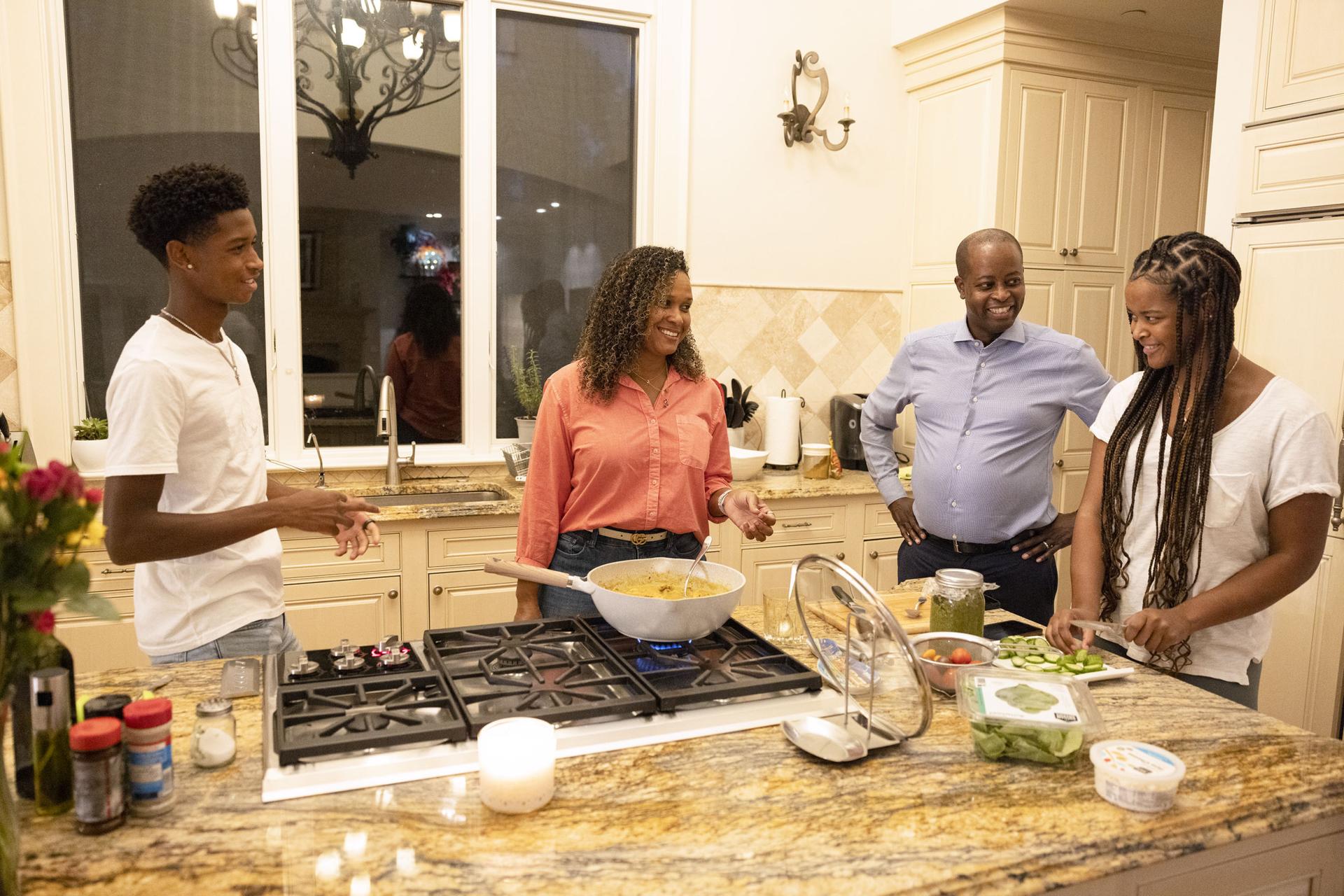
COOKING FOR FOUR: Dr. Frederick savors moments with his family, like this one, where his daughter, Kirie, preps dinner. Photo by Pete Souza
His family always determinedly comes first. He is surrounded by them; besides his wife and children – Simone, Wayne Jr., and Kirie – his mother, Frances Tyson-Hill; his 99-year-old grandmother, Christine Tyson; and his aunt, Luanne Roach, are also often by his side (the three elders still live in Trinidad). His family is almost always the bedrock of all his stories.

His mother, who Dr. Frederick calls his inspiration for becoming a doctor (she was a nurse for 50 years), is a tiny woman who looks like a replica of Dr. Frederick’s grandmother and aunt. She remembers when he was a small child. He didn’t wince as he watched her manage patients in their home, even if it meant uncovering some unpleasant-looking wounds.
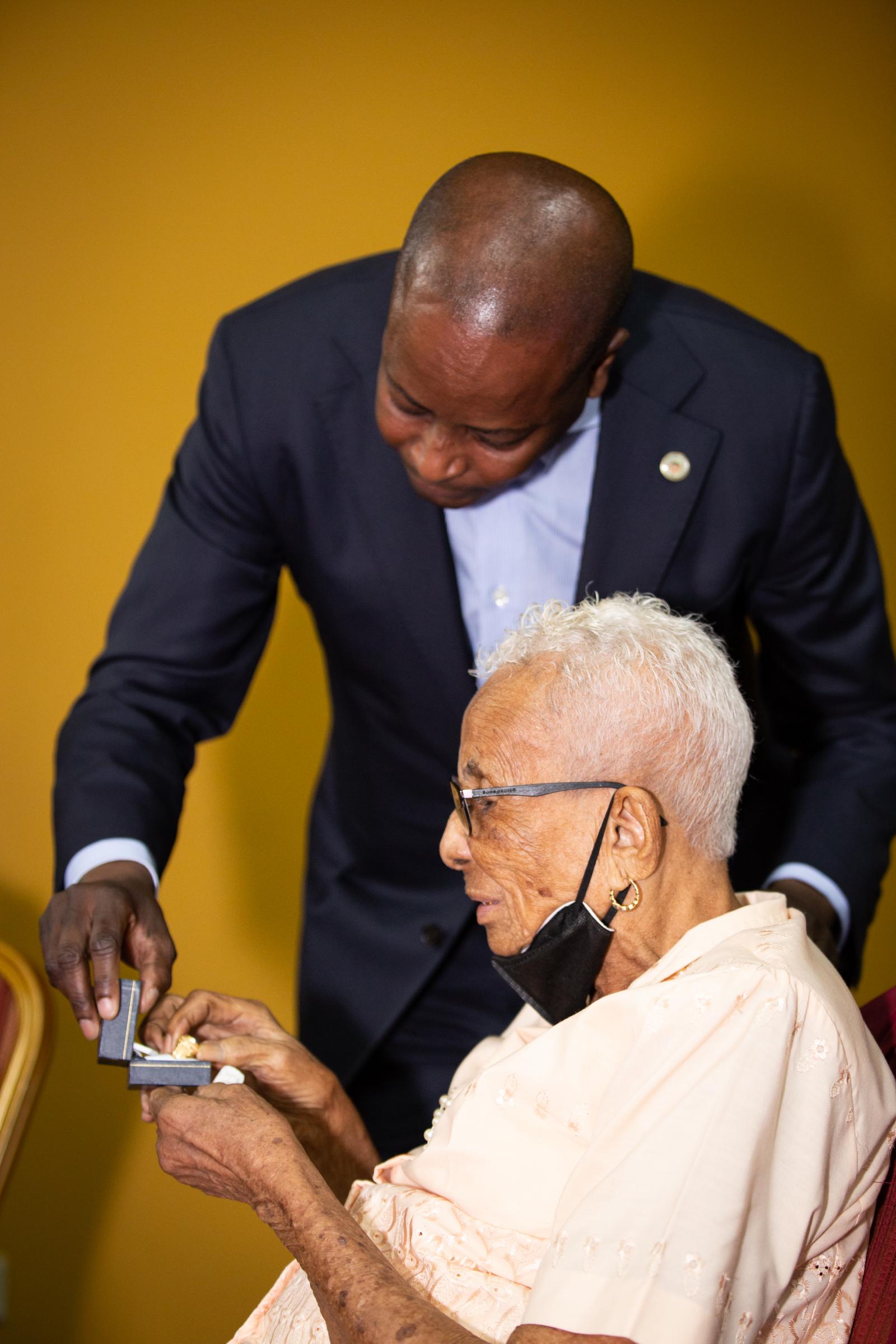
“He was always ambitious, always very intelligent,” she says about her son. She wasn’t surprised when he became a doctor, but did not expect he would also become president of Howard. Proud isn’t a word she likes to use, citing her friends who claim she is being humble. “My thing is, I’m happy,” she says. “[I have] three boys, and I’m happy with all of them. … I’m glad to be alive and around to see my children.
The First Lady
Simone Frederick is a constant, calm presence next to her husband. She is also from Trinidad; they met on the last day of Carnival in 2002, the day before Valentine’s Day, through mutual friends. By then, he had already left Trinidad – and Howard – to pursue a fellowship in oncology at University of Texas MD Anderson Cancer Center. She remembers exchanging numbers, and then he flew back to Texas the next morning. There were a lot of expensive long-distance phone calls, back when paying for long-distance calls was a thing, and then a lot of plane trips back and forth. In 2004, they were married
“We ended up getting engaged during Carnival, married during Carnival, so Carnival is kind of like a special moment for us,” Mrs. Frederick says.
As first lady, she understands that her role is crucial in the success of the president, something she wants to emphasize to future first spouses. “It’s a 24/7 job,” she says of the presidency. “And I think it can sometimes feel like the entire family is under a microscope … but, you get through it as a family.
To make it all possible for Dr. Frederick, her role is crucial on the family. “I think it also helps that he knows that I’m there to hold down the home front. So he doesn't have to worry about the kids and stuff. And he’s always managed to find time, I don’t know where he finds time, but managed to find time to do it all and always makes time for his family, because that’s what is most important to him,” she says
She says that her role has been unique, especially for someone who didn’t grow up in the United States or attend Howard. Through the years, she’s forged “strong relationships among the faculty, staff, students, alumni, to champion the many great causes of Howard University,” and almost feels like she’s an alum. “I’m proud to be part of that.”
From the First Lady
By Simone Frederick
It has been an absolute pleasure to be Howard University’s First Lady! It has been a truly unique opportunity for me to experience the rich culture of this University’s storied traditions. I was equally honored and humbled by the duties afforded to me as first lady. But I could not have accomplished any of it without the diverse, brilliant professionals who worked with me to help execute many of my projects.
I have a lot of great memories of Howard but a few stand out: move-in day, graduation day, and homecoming. For me, as a mother, I look to these events because it brings the students the greatest joy. Having the opportunity to watch students enter their dorms for the first time; connecting with old friends and meeting new ones; saying goodbye to loved ones; the unbridled joy on the students’ faces as they embark on their journeys was truly awe-inspiring. And then at graduation, the pride and the anticipation of what’s to happen next – I felt their hope for the greatness that will come. Finally, homecoming! This occasion pulls the whole college experience together in one event. It generates the most excitement in our household! It is always such an enjoyable event, a chance for the whole Howard community –past, present, and future – to come together to celebrate the successes of the University.
My advice to the next president, from our family, is to simply embrace Howard University and its traditions with open arms. We certainly did that as a family and we benefited from the strength and love bestowed on us when we needed it the most. The future president can rely on our continued love and support even as we move on. Our family knows first-hand how very consuming the position of the President can be, and that is something that takes getting used to.
I wish I can convey how very emotionally invested my husband is in the success of Howard University. He’s very dedicated to preserving its legacy and he’s strived to make it an excellent place. He also has a great team; a very confident, competent team behind him who gives him sound advice.
We have been slowly preparing for this moment. These are two very big changes – retirement and empty nesting. I've been a stay-at-home mom for over 12 years. So, the feeling that my kids will not be around me soon or will not need me for much anymore is a bit discerning, but we are coming to terms with it. My husband’s retirement from Howard will happen simultaneously, so we both have been tossing around “what next” questions on both events. I predict the two of us will spend a lot of time together, traveling and just looking forward to whatever adventure comes next.
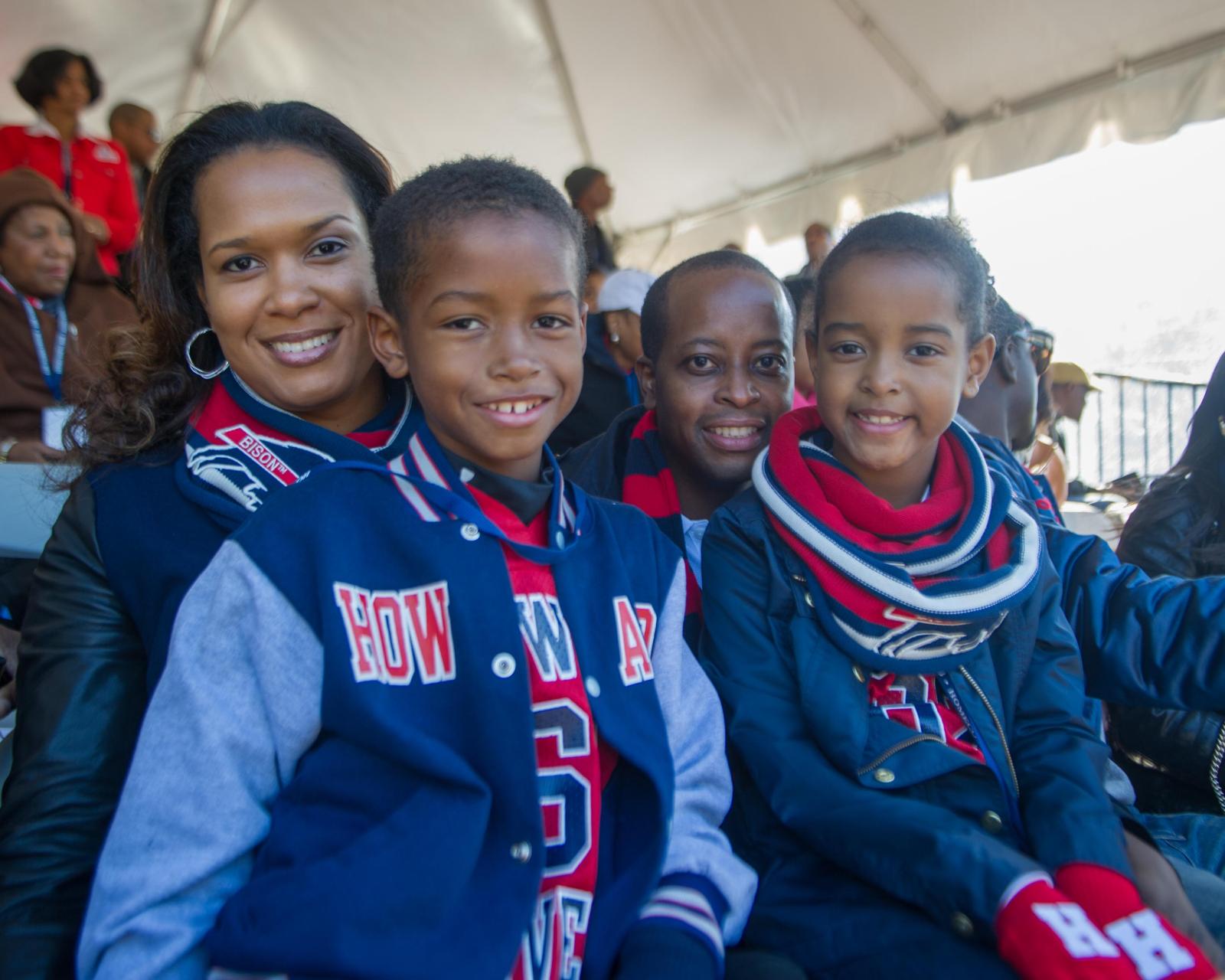
My Dad, the President
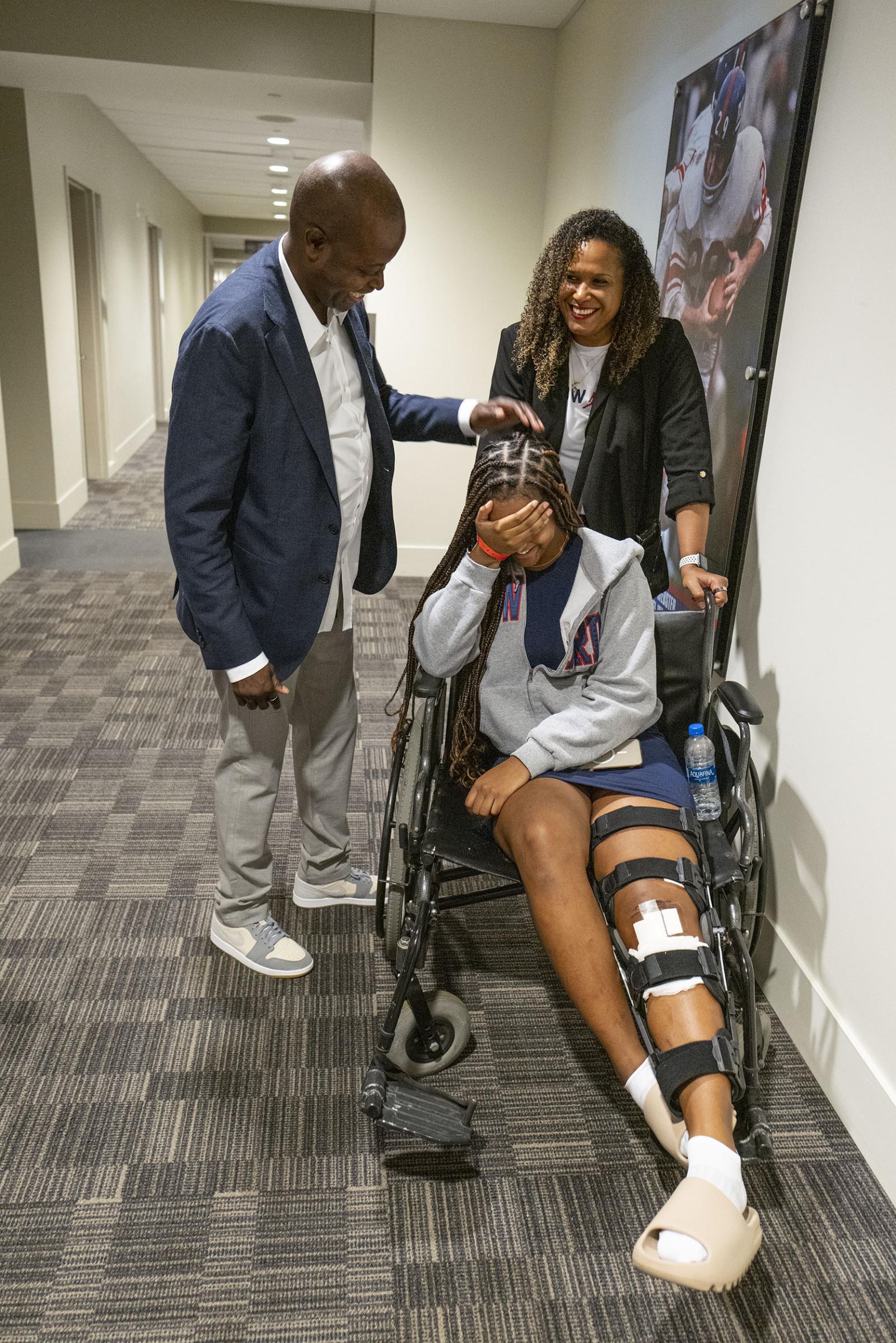
“Dad, it hurts,” Dr. Frederick’s 16-year-old daughter, Kirie, said as he leaned over her wheelchair at the MetLife Stadium outside New York City. She had surgery for a torn ACL on a Wednesday at a hospital in Manhattan, and it was now Saturday, September 17, 2022, the day of the inaugural HBCU Classic in New York, Howard versus Morehouse. Guests paraded in and out of the suite to give her their well-wishes and serenade her with their own stories of torn ACLs. Dr. Frederick, switching between physician and daddy mode, examined the knee, questioned her and his wife about pain medication dosage, and then gave her a hug.
Wayne Jr. and Kirie are the center of Dr. Frederick’s universe: they’re both athletic, studious, and well-mannered, having grown up under the watchful eye of the world. They are children of Howard: Kirie was born at Howard University Hospital, they attended the preschool on Howard’s campus, and walked the halls of Howard with their father
“His children grew up on campus, so everyone knew them. Sometimes they would be in the office in the mornings or they would come back in the afternoon. And they appreciated that time with him,” recalls LaRue Barkwell, Dr. Frederick’s former chief of staff. She says telephoning his grandmother and his mother were “essential parts of his daily life.”
The whole family attended most major events – Homecoming, graduation, Charter Day, athletic games, performances, and so forth. Through the years, the role of helping Dr. Frederick put on his ceremonial robes would shift between Mrs. Frederick and Kirie.
“This has really helped with their social development skills,” remarks Mrs. Frederick. “My daughter has always said [how] she really learned how to talk to adults from attending all of these events.
Dr. Frederick views his legacy through his children and has named several things after them – the lab at his high school where he donated money to purchase equipment, a room at the Health Sciences Simulation Center at Howard College of Medicine. He also named a scholarship after his mother.
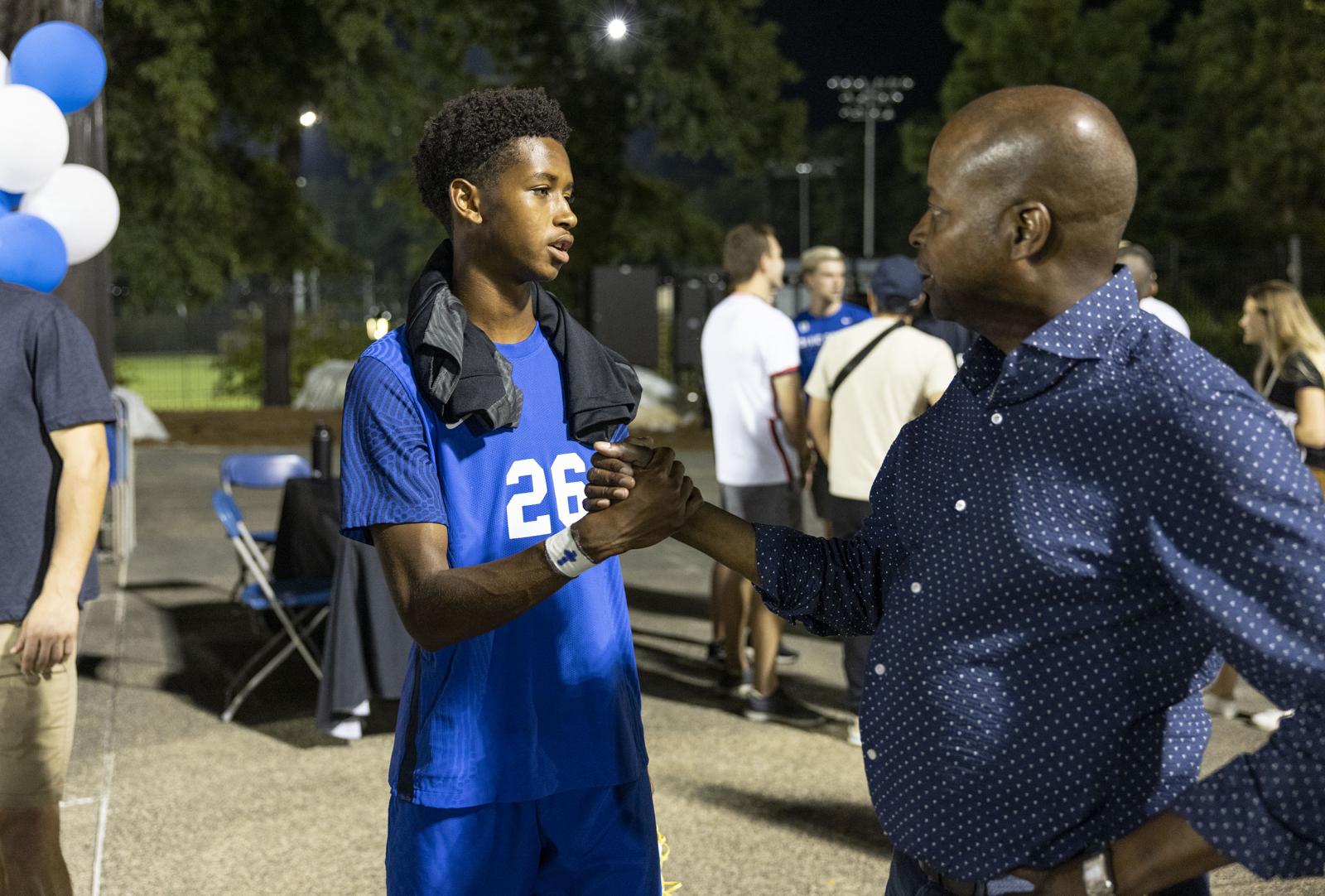
On a warm Friday September evening, while sitting on the aluminum benches at the soccer stadium of Duke University, Dr. Frederick laid out his two phones – one personal, one work – a giant bucket of buttered popcorn, and a bottle of water. Wayne Jr. is a freshman on the soccer team. The popcorn became routine as he jets down as often as possible to every home game he can. Earlier in the day, he had presided over Opening Convocation with keynote speaker Congressman James Clyburn; he now greeted fellow soccer parents who call him Wayne. He switched between chatting with his neighbors and scanning the emails that pour in on his work phone. When Wayne Jr. headed onto the field, Dr. Frederick’s entire attention was fixated on the turf.
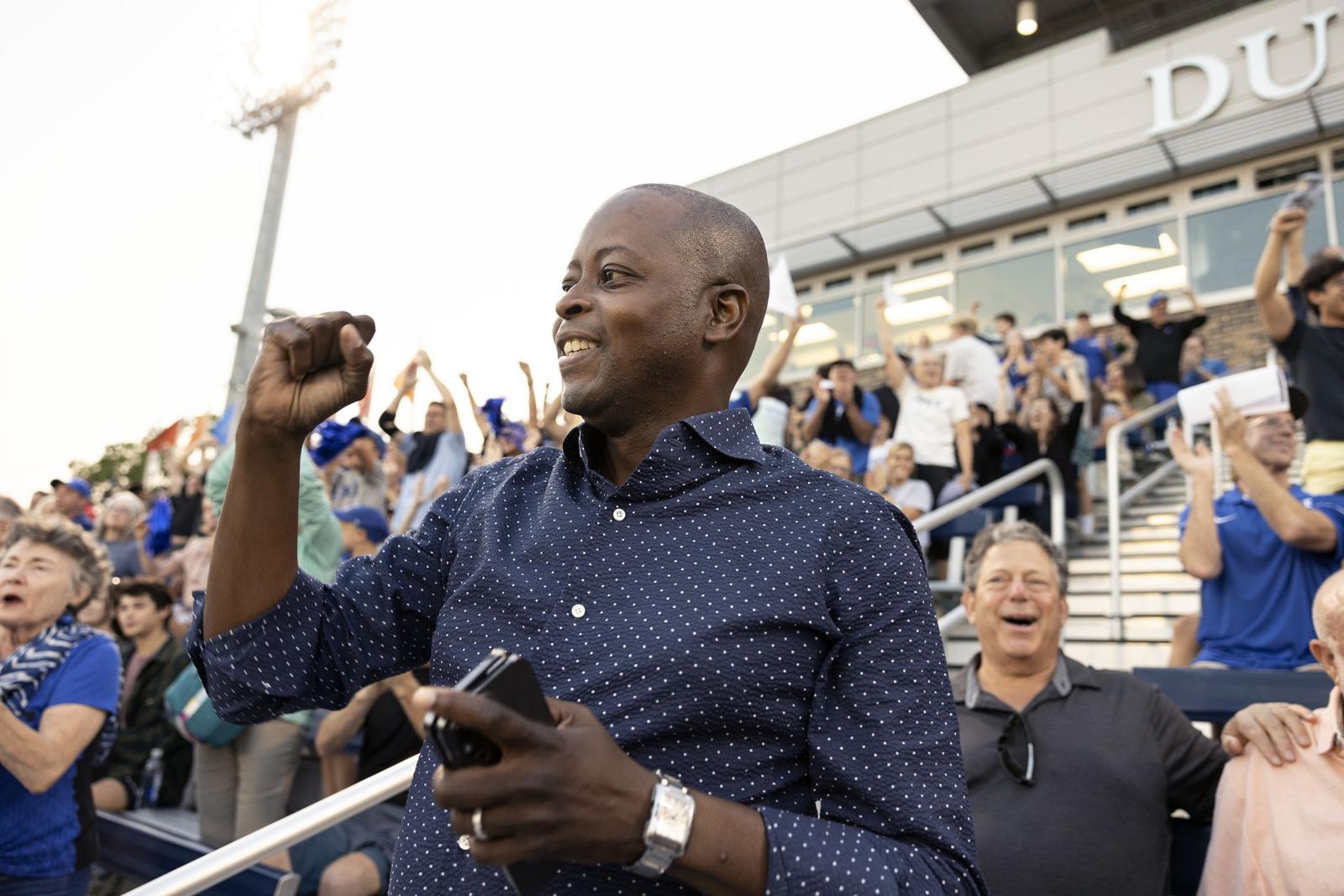
This particular game, which was against major rival North Carolina State, was fierce. It ended in a 1-1 tie, and Wayne Jr. was disappointed. Dr. Frederick listened to his son’s frustrations attentively. Then they hugged, and he would wait for Wayne Jr. to shower before they headed to dinner, just the two of them.
Through the Years
By Shaka Hislop
Wayne and I went to high school together. He was very small, and I was very tall, so people called us Mutt and Jeff after the popular comic strip. I was recruited to Howard to play soccer. I was having a ball up there, and I thought it was a great university and told him to apply.
Right after he came up to Howard, he had gone through freshman orientation and I came to meet him. He was a very slight young man, as he puts it, 88 pounds soaking wet. We were in Douglass Hall. A young lady stopped to speak to me. We were just talking about the first week of school, and then she looked at Wayne, and put her hands on her knees and said, “and what about you, little boy? Do you want to go to Howard someday?” I nearly died right there. It was incredible. We tell that story all the time. Given everything Wayne has gone on to achieve at HU, it still makes us laugh retelling that story. I wish I could remember who the girl was, and often wonder if she remembers that meeting, what she said, or recognizes that Wayne was that “little boy.”
Wayne was a groomsman in my wedding, I was the best man in his. He’s godfather to my son. We see each other almost 15 times a year and we speak regularly, almost daily. We’ve always supported each other. I’ve always been comfortable discussing anything with him. He is a very loyal friend, the brightest person I know. I know being president of our alma mater is Wayne’s proudest achievement. There’ll be no other institution that will mean as much. As a triple HU alum, he’s ready for whatever is next.
Shaka Hislop (BS ’92, MBA ’13) is a retired pro soccer player and a commentator for ESPN FC.

The next morning, he hopped on a plane to New York City to attend the HBCU Classic and check on his daughter’s recovery. This was his second flight to New York that week; the first was on Wednesday, when Kirie underwent surgery.
“What works for me first is prioritization,” explains Dr. Frederick about how he manages everything. “And a big priority for me is my family, especially my kids, so I do just about anything possible to be there.” Another time: “I saw my son play on Saturday, I flew out of the country and flew back late Monday night into Tuesday, so I could see him play Tuesday again.”
How does it keep him from being burnt out? “Make sure that you’re passionate about what you’re doing, and that you are having some joy from it,” he says. “Sometimes we can make things become mundane. And you have to be careful about that. I am obsessed about the journey of life, because I don’t think there is any destination that will completely fulfill me.”
In Truth and Service
“Truth and service,” Howard’s motto, is very much entangled with Dr. Frederick’s personal motto. He supports causes behind health care, education, and enabling minorities in educational endeavors.
Dr. Frederick believes in providing education to as many people as possible, by removing as many barriers in place to receive that education. At Howard, he and his wife have established an endowed fund to support projects across the campus. In addition to the scholarship he created in his mother’s name, he was determined to remove financial barriers to otherwise bright students through the Graduation Retention Access to Continued Excellence (GRACE) Grant. Established in 2014, the need-based program provides a 100% match for students who receive the maximum Federal Pell Grant and provides additional funding to those with an expected family contribution of $0. Since its inception, GRACE recipients saw an average four-year graduation rate of 95%.
“As a family, it’s very important for us to give back to the community. And education is also an important aspect of that,” explains his wife, Simone Frederick. They frequently give back to Trinidad and Tobago, their country that enabled them to embark on this journey. On a visit to his high school, St. Mary’s College, back in Trinidad, he and Mrs. Frederick noticed that the science labs were in dire need of repair. “We pledged to renovate the lab and buy supplies to furnish it,” she says. “And that came to fruition in the past year. That’s something we were very proud of.
As a sickle cell patient himself, he is also actively involved with the Center for Sickle Cell Disease at Howard University Hospital. He also sits on the boards of medical innovation companies, including Tempus labs, Insulet, Humana, and Forma Therapeutics, as well as the American Cancer Society. He also works with the U.S. Chamber of Commerce on entrepreneurship opportunities for minority students. He helped to establish the Karsh STEM Scholars Program at Howard to create research opportunities and pathways to terminal degrees for minority students. He is also a proponent of increasing opportunities for women, often throwing his support behind such programs and initiatives and also actively promoting women at Howard (including growing the decanal leadership to include 11 women).
Though Dr. Frederick has created a number of formal contributions, it’s his off-the-cuff help that he hands out so freely that truly reflects his philanthropy. With Hislop, they have gathered books to donate to children in Trinidad, and Dr. Frederick accompanied him to the island of Tobago to help distribute soccer equipment through Hislop’s foundation, where he also spoke to the children about the importance of gaining a solid education. He also doles out advice to sickle cell patients and their families: on his recent trip to Trinidad, he met a staff employee at the University of West Indies whose 10-year-old daughter has sickle cell disease and gave her his personal mobile number. She’s not the only sickle cell patient or parent who has his number stored in her phone so they can call him at any time to discuss their concerns.
(He also exchanged information with one of the older soccer players on the girls’ team he and Hislop visited in Tobago, someone who had expressed interest in attending Howard.)
Dr. Frederick has a constant desire to help people, Mrs. Frederick says, a quality she notes is one of her favorites about him. “He’s always willing to give up his time, money, expertise, even if it means upsetting his already very busy schedule to fit someone in to help them. He will do it, no matter what.”
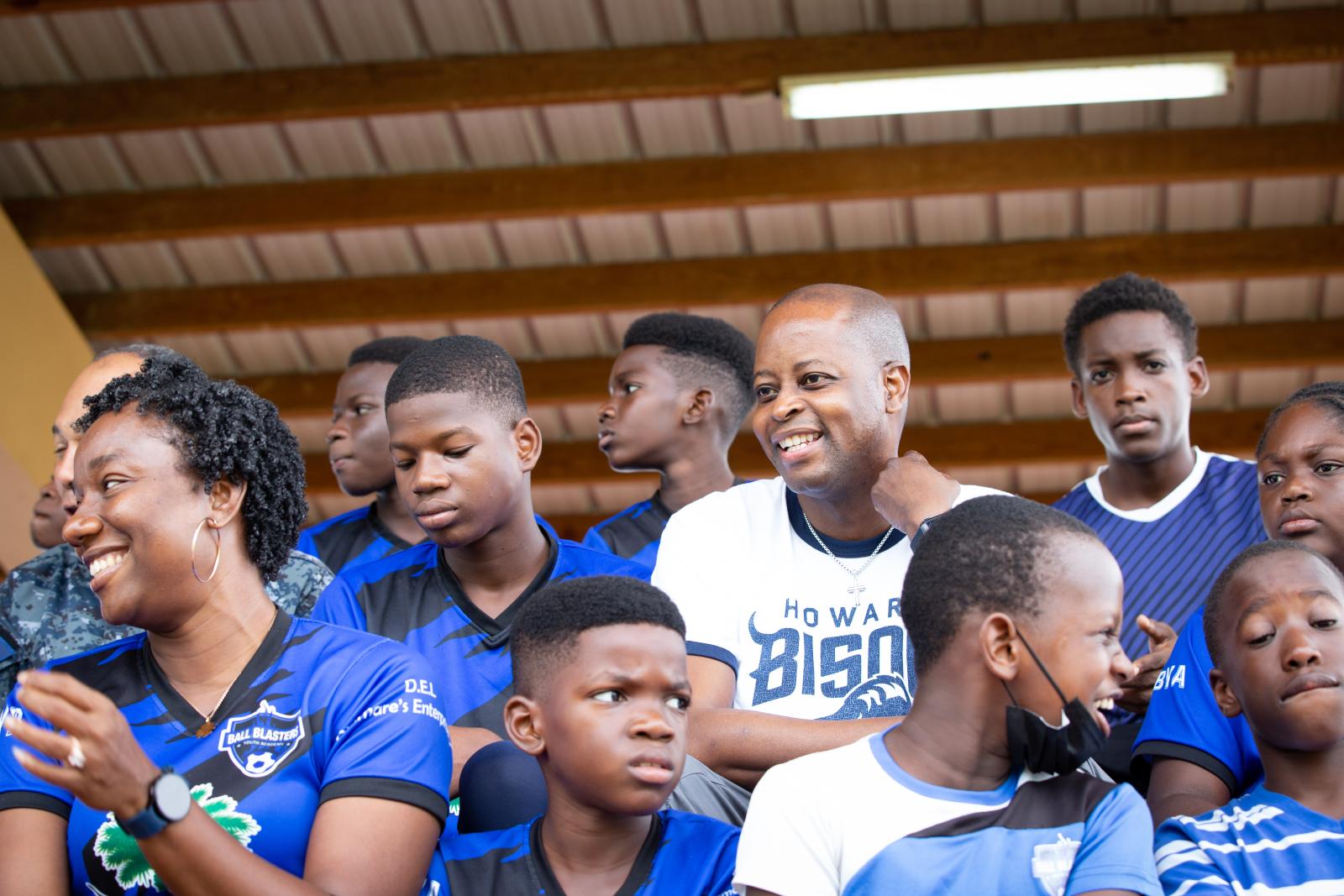
A Man and His Island
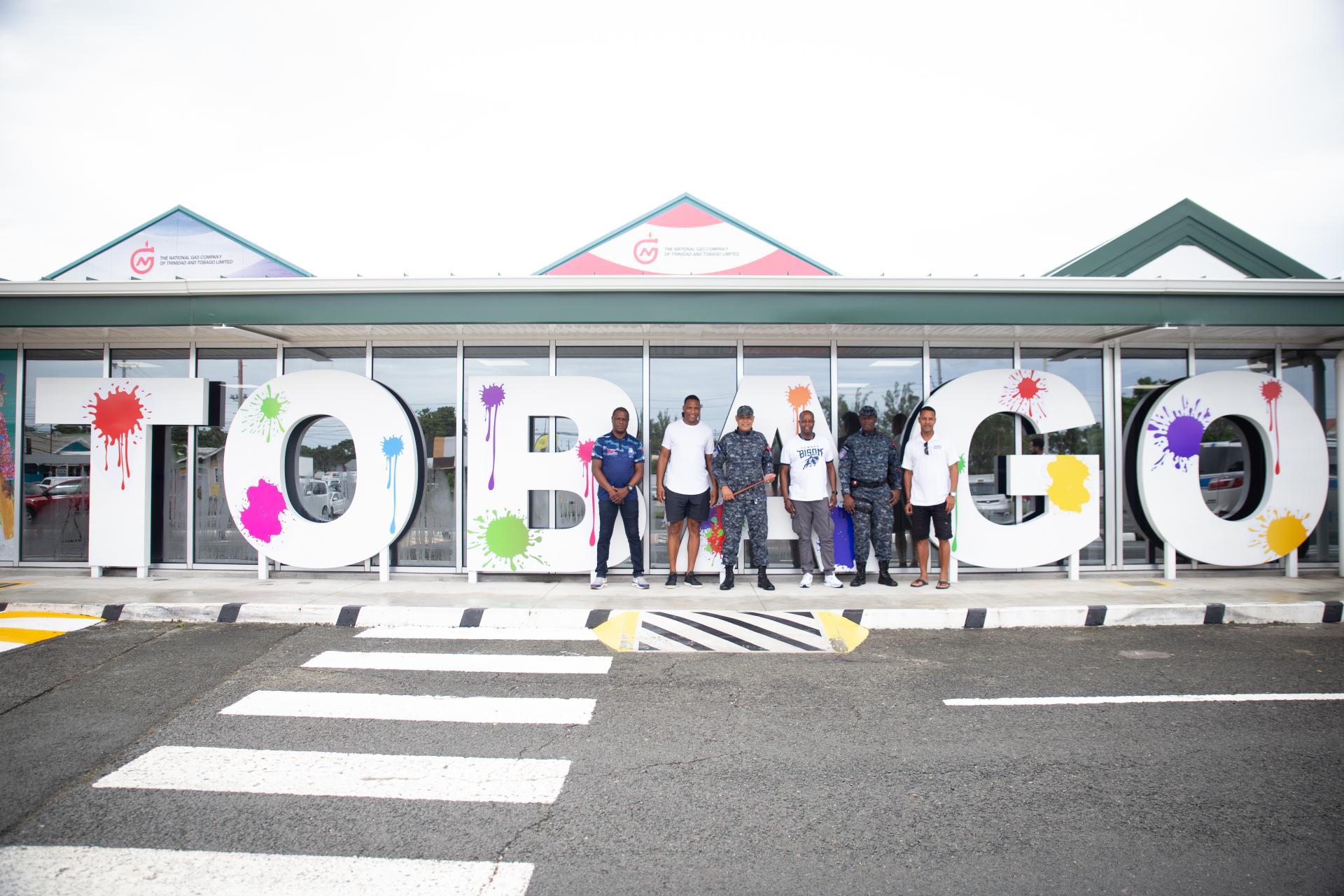
Dr. Frederick accompanied longtime friend Shaka Hislop to Tobago to distribute soccer equipment to local children's teams on the island. Photo by Rin-rin Yu.
As soon as the plane bumped down on the lush island of Trinidad with rainy season clouds looming overhead, Dr. Wayne A. I. Frederick already had a hankering for some doubles. Doubles are a popular Trinidadian street food item of Indian flavors, essentially round fried dough rolled with curried chick peas and chutneys, a blend of spicy and sweet and salty all at once. Locals call it their comfort food, something to remind them of home, and that’s where he was. A food stand by the taxi airport pickup sold them, and as soon as he made it through customs, Dr. Frederick beelined towards the stand.
It’s a joke among his administration who say they have never witnessed Dr. Frederick eat lunch, because he’s so busy racing around. But on this late October trip, even if it was for a quick weekend, his days were taken up by the tastes of home, and the family and friends who joined him.
Trinidad and Tobago are separate islands; Trinidad is where people work and live, while Tobago is where they play (though, of course, people still do both on each island). It was in the city of Port of Spain, Trinidad where he grew up with his mother, a nurse; his two brothers; his grandmother; and grandfather, a school principal-turned lawyer. Dr. Frederick’s father was a police officer who died when Dr. Frederick was only three.
He is not the first Trinidadian to leave the island and go to Howard. “My mom was totally obsessed with the first prime minister of Trinidad and Tobago [Eric Williams], who was a political science professor here at Howard,” he says. And then he started to notice that everyone who went abroad to study seemed to go to Howard, including the doctor who delivered his two younger brothers. “They were always everywhere.”
Port of Spain is speckled with palm trees and industry, where cargo ships dotted the blue Caribbean waters and tropical trees grow wide and shady. His mother still lives in the house where he grew up; back then, he remembers the neighborhoods being wide open. Today, the neighborhood is fenced and gated – a reflection of the changing times.
He would attend St. Mary’s College for high school, where he and his best friend, Shaka Hislop, kicked around soccer balls (“footballs”) and did their homework – where Dr. Frederick would excel at his studies and dream of attending a university such as Howard.
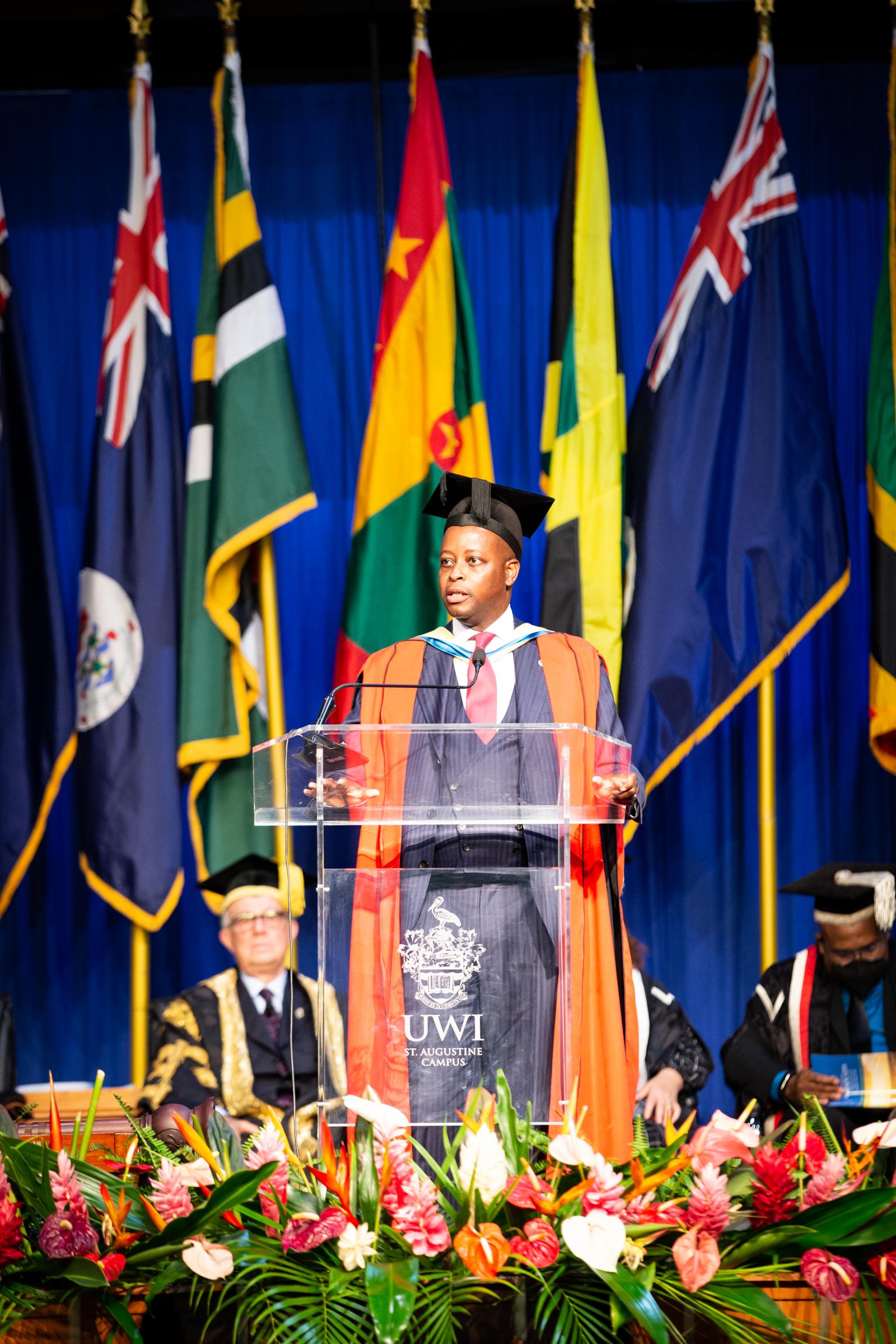
During this particular October visit, he received an honorary degree from the Faculty of Medical Sciences at the University of West Indies – St. Augustine; met current students from his high school, St. Mary’s College, where he donated lab equipment; and caught up with friends and family. He would also accompany Hislop, now also one of Trinidad’s national icons for his success as a professional soccer player, to Tobago for the morning while they distributed soccer equipment to children’s teams. (In the airport security line for Tobago, passengers recognized both Hislop and Dr. Frederick and took photos with them).
To return to Trinidad and Tobago as the president of that dream university is one that Dr. Frederick does not take for granted; and he understands the importance of returning home to share his journey. He told the Class of 2022 at the University of West Indies graduation: “Our purpose is to steward our institutions, our countries, and our world from one era to the next. We must take that which we inherit and endow it with strength and vitality so that we may pass it on to our descendants.”
Article ID: 1191
Keep Reading
-
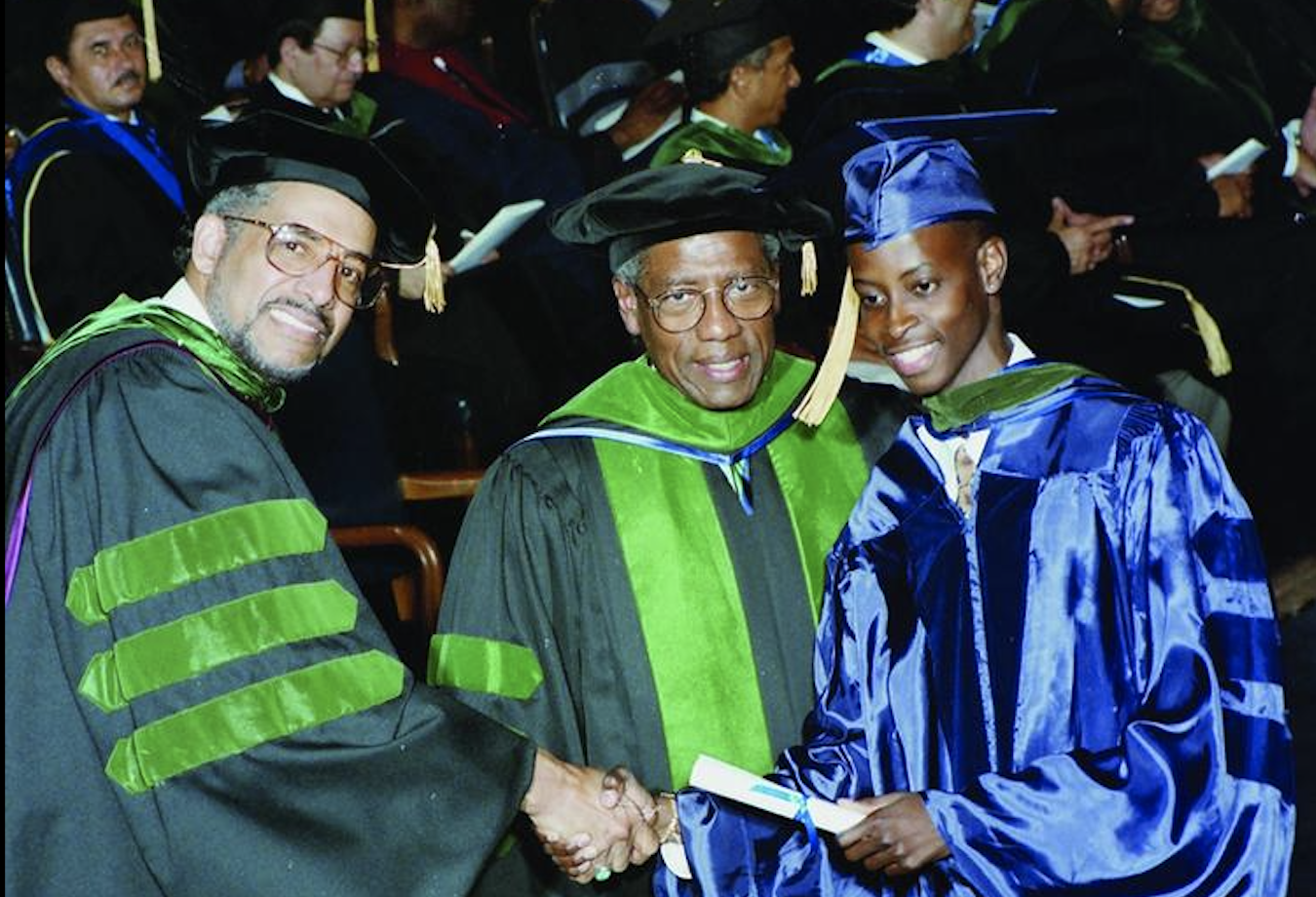
A True Son of Howard
Dr. Frederick accepted the offer that Howard University made to him to join the freshman class in 1988. It was the beginning of a journey that would define his life.
-
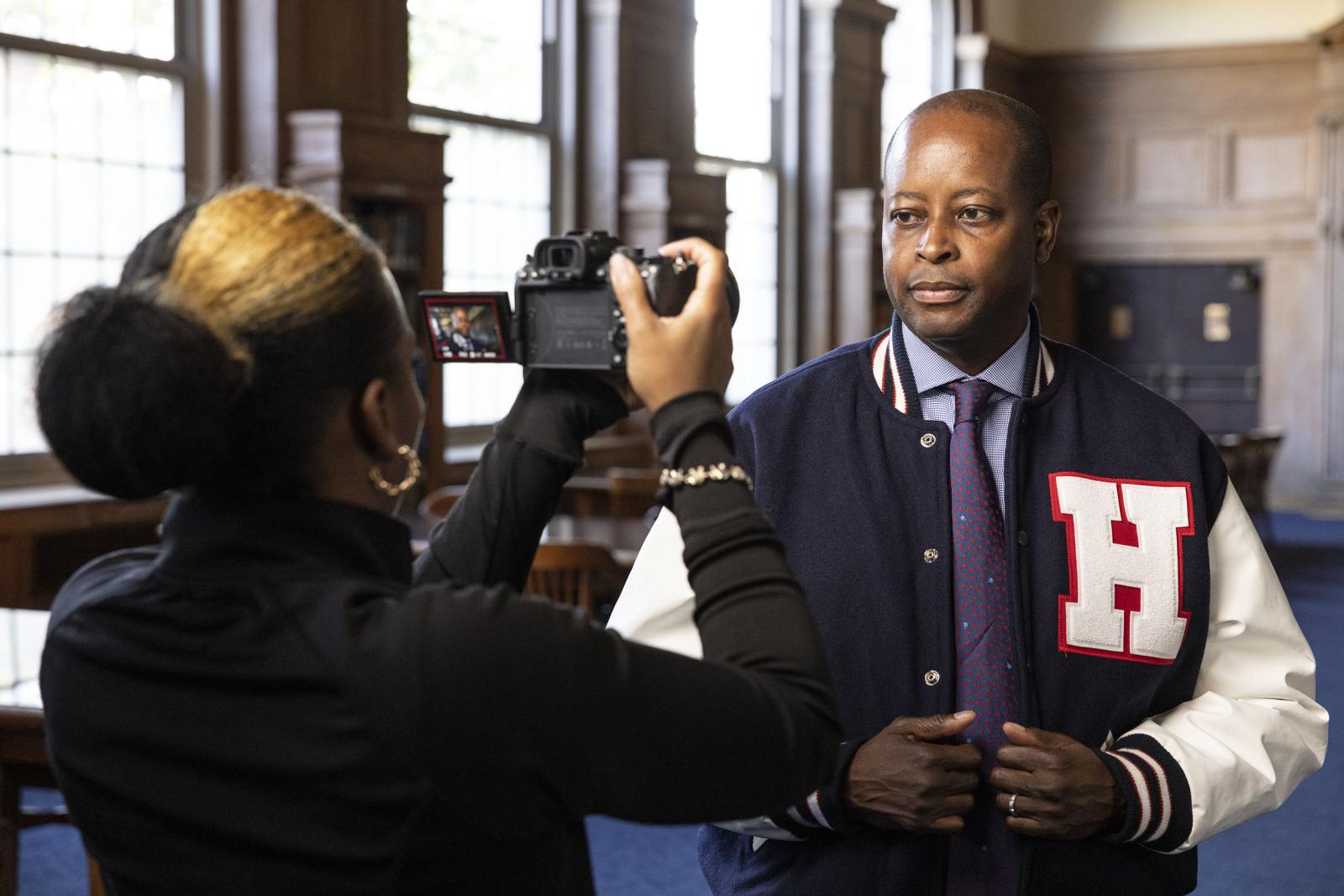
The 17th Presidency: A Transformational Decade
The Story of Howard University’s 17th Presidential Administration, led by Dr. Wayne A. I. Frederick
-
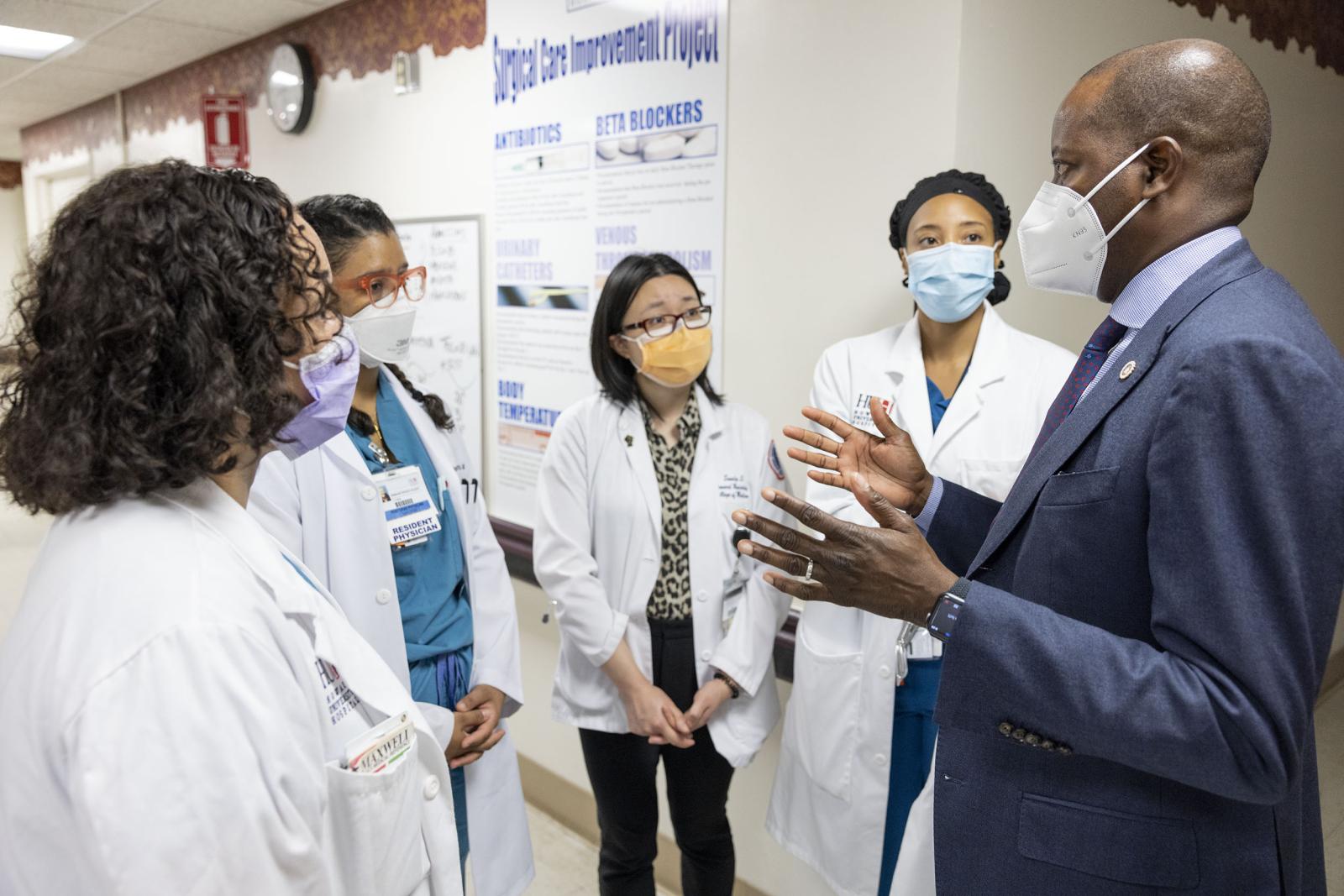
Professor Frederick
How education became the forefront of Dr. Frederick’s legacy.




